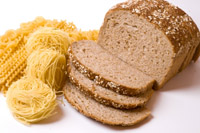3 Macronutrients: Fat, Proteins, Carbohydrates
X20-35% of calories should come from fats
XImportant for normal growth and development; energy (most concentrated source); absorbing certain vitamins (A, D, E, K); provides cushioning for organs; maintains cell membranes
X10-35% of calories should come from proteins
XImportant for growth, tissue repair, immune function, make essential hormones and enzymes, energy when carbs aren’t available and preserving lean muscle mass
X45-65% of calories should come from carbs
XBody’s main source of fuel; all tissues and cells can use glucose (a carb) for energy; carbs are need for the central nervous system, the kidneys, the brain and muscles to function properly; can be stored in muscles and liver; important for intestinal health and waste elimination
XAlthough not a macronutrient, Alcohol has 7 calories per gram
X1 standard US drink = 17 mL of Alcohol
X1 drink = 1.5 oz liquor, 5oz wine or 12 oz beer
XRecommendations are 2 drinks a day for men and 1 drink a day for women
XTo calculate the number of drinks in an alcoholic beverage, multiple the percentage of alcohol x volume in mL and divide by 17
For example: 800 mL of Wine; Contains 12% Alcohol by volume
800 x 0.12 = 96 mL of alcohol
96 mL / 17 mL = 5.657 servings of alcohol1.5 oz Liquor = 43 mL; Contains 40% Alcohol
43 x .4 = 17.2 mL5 oz Wine = 142 mL; Contains 12% Alcohol
142 x .12 = 17.04 mL12 oz Beer = 341 mL; Contains 5% Alcohol
341 x .05 = 17.05 mL
 D. Kyle.
Red Raider at TEXAS TECH UNIVERSITY Ŧ. Avid Tweeter. Omnivore. 10 fingers and 10 toes. Known for
D. Kyle.
Red Raider at TEXAS TECH UNIVERSITY Ŧ. Avid Tweeter. Omnivore. 10 fingers and 10 toes. Known for 

